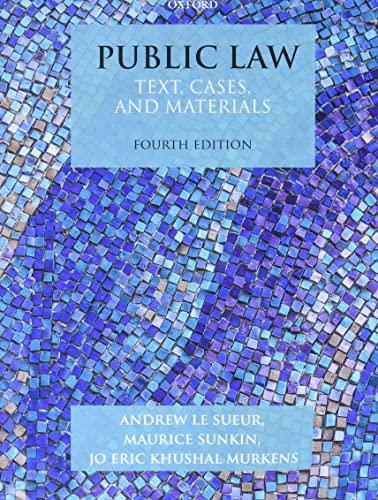Answered step by step
Verified Expert Solution
Question
1 Approved Answer
Discussion Questions We are now examining the role of implied trusts and how implied trusts differ in purpose from express trusts . By looking at
Discussion Questions
We are now examining the role of implied trusts and how implied trusts differ in purpose from express trusts. By looking at the examples below, we will compare the different fact scenarios to see whether an express or implied trust is triggered (or neither).
Consider the following situations. For each of the situations below, answer these questions:
- Does the holder of the property hold that property beneficially? (i.e. is it a gift to him/her from the donor? Is he/she free to deal with the property in any way he/she wishes?)
- Does the holder of the property hold that property on trust? If so, who is the beneficiary?
- Alice gives HK$1,000,000 to William. Alice tells William that the money is for the purpose of an arranging an elaborate farewell party to celebrate her life after she dies.
- Alice gives HK$1,000,000 to her new boyfriend Charlie and tells him to use the money to buy himself something nice for his birthday.
- Alice gives HK$1,000,000 to her new boyfriend Charlie and tells him to use the money to buy her something nice for her birthday.
- Alice gives HK$1,000,000 to Matthew (a famous professional author) and says that she is hiring him to write a biography about her life after she dies.
- Alice gives HK$1,000,000 to Betty, her financially struggling college roommate.Alice tells Betty that the money "is for helping you pay for the costs of University".
- Same as #5 above, but after receiving the money, Betty marries her wealthy boyfriend and withdraws from University. She still has Alice's money in her bank account.
- Same as #5 above, but after receiving the money, Betty immediately withdraws from University and uses the money to start a small business.
- Same as #5 above. Betty uses the money to pay for her University expenses and successfully graduates.Upon graduation, there is still HK$200,000 remaining from the original sum that Alice gave her.
- Alice gives HK$1,000,000 to her law school classmate Cathy. Alice tells Cathy that the money is to pay for the University tuition of Cathy's 10 year old brother Edward. A few years later, Edward decides not to attend University and starts work instead.
- Bob gives HK$5,000,000 to his classmate Ellie. Ellie uses all of the money to purchase a small flat in the New Territories in her own name. After 2 years she sells the flat for HK$10,000,000.
- Same as #10 above, would your views change if Ellie and Bob were married?
- Hugo gives HK$5,000 to the President of the Student Law Association of CUHK.Hugo tells the President that the money is for the purpose of starting a mah jong club so that students can reduce stress and make some money by gambling as well. But before the President can start the club, the Prohibition of Mah Jong Clubs on University Campuses Ordinance (Cap ) comes into effect.
Step by Step Solution
There are 3 Steps involved in it
Step: 1

Get Instant Access to Expert-Tailored Solutions
See step-by-step solutions with expert insights and AI powered tools for academic success
Step: 2

Step: 3

Ace Your Homework with AI
Get the answers you need in no time with our AI-driven, step-by-step assistance
Get Started


